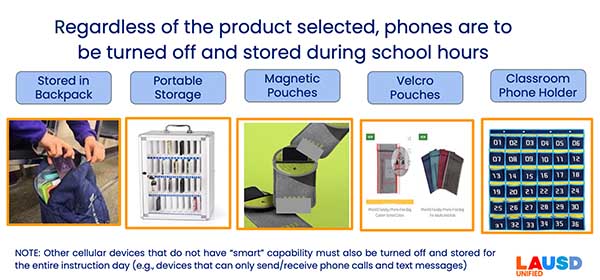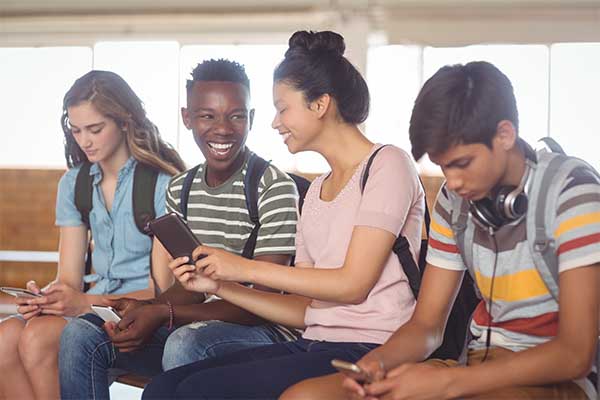 In February 2025, the Los Angeles Unified School District (LAUSD) implemented a district-wide ban on student cellphone and smart device use during school hours. Aimed at improving focus, reducing cyberbullying, and supporting student mental health, the policy has sparked mixed reactions from students, parents, and teachers. This article offers a firsthand perspective from a high school student within LAUSD, exploring how the policy is reshaping daily school life. [Editor’s Note]
In February 2025, the Los Angeles Unified School District (LAUSD) implemented a district-wide ban on student cellphone and smart device use during school hours. Aimed at improving focus, reducing cyberbullying, and supporting student mental health, the policy has sparked mixed reactions from students, parents, and teachers. This article offers a firsthand perspective from a high school student within LAUSD, exploring how the policy is reshaping daily school life. [Editor’s Note]

In February 2025, the Los Angeles Unified School District (LAUSD) implemented a new policy banning the use of cellphones and smart devices during school hours. This decision has sparked a mix of reactions among students, parents, and teachers. As a high school student in LAUSD, I have observed firsthand how this policy is affecting our daily school life.
The LAUSD Board of Education voted in June 2024 to enforce a district-wide ban on student cell phone use during school hours, including breaks and lunchtime. The ban also extends to smartwatches, earbuds, and other devices capable of messaging or internet access. The primary goal is to reduce distractions, combat cyberbullying, and improve mental health among students. Superintendent Alberto Carvalho emphasized the need to address students’ “addiction” to digital devices, stating that this problem “needs to come to an end.”
Each school within the district has the autonomy to decide how to enforce the ban. Some schools require students to store their phones in backpacks, while others use magnetic pouches, Velcro-sealed bags, or classroom phone holders. The district has provided funding for these storage solutions, and schools were instructed to finalize their chosen methods before the winter break in December 2024.
The policy includes exceptions for students with health needs, those with Individualized Education Programs (IEPs), and students requiring translation assistance. In emergencies, students are allowed to access their phones when staff determines it is safe to do so. For instance, during extended lockdowns, students may be permitted to use their devices to communicate with parents.
Reactions from students to the LAUSD cellphone ban have been all over the place. Some students actually think it’s a good idea. Without their phones constantly buzzing or tempting them to scroll, they say it’s easier to focus in class and even connect more with classmates. “I didn’t realize how often I was checking Instagram or texting,” said Leanna, a sophomore. “Now, I’m more present in class and even talk more to the people around me.” Teachers have also noticed fewer disruptions and more participation during lessons.
Unfortunately, not everyone is happy about it. A lot of students feel like the policy is way too strict, especially banning phones during lunch, breaks, or even passing periods. “That’s our only real free time during the day,” said Julie, a junior. “Sometimes I just want to listen to music or text my friends, and now I can’t.” For many of us, phones are a way to decompress during a long school day. Without them, some students say they actually feel more anxious or stressed out, not less.

Many parents support the initiative, hoping it will enhance academic focus and social development. However, some are concerned about the inability to contact their children during emergencies. The district has addressed these concerns by ensuring that students can access their phones in critical situations, with staff guidance.
The new phone ban is already changing the way students act and learn during the school day. Since the policy was put into place, many teachers say they’ve noticed a big difference. There are fewer distractions in class, and students seem more engaged with the lessons. Some students agree that the ban has helped them stay focused. Without the constant temptation to check messages or scroll on social media, it’s easier to concentrate on schoolwork. “I get my assignments done faster now,” said Zeze, a junior. “I used to stop working just to check TikTok. Now there’s nothing to check.”
On the other hand, some students say the change has made the school day feel longer and more stressful. For some of us, being able to listen to music between classes or during lunch helped us reset and get ready to focus again. Without that, staying motivated is a little harder. There are also positive signs when it comes to behavior. Fewer students are getting in trouble for texting during class or filming TikToks in the bathroom. Some schools that started similar bans earlier saw a drop in bullying and even better grades, especially in math and reading. LAUSD is hoping for the same results.
In the end, the policy is already having a noticeable impact. Whether those changes are good or bad really depends on who you ask. But one thing is clear, school definitely feels different without phones.
The LAUSD’s cellphone ban represents a significant shift in school policy, aiming to prioritize students’ well-being and academic success. While the transition has been challenging for some, the potential benefits of reduced distractions and improved mental health are promising. As students adapt to this new norm, ongoing communication between the district, schools, and families will be essential to address concerns and ensure the policy’s effectiveness.
<Esther Hong Student Reporter> LACES ehong0006@mymail.lausd.net
Previous [Esther] More Than Volunteering: Ashley Lee’s Life-Changing Journey with PAVA








